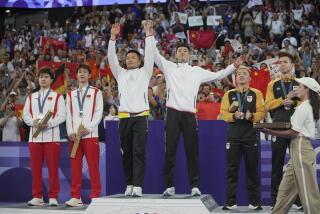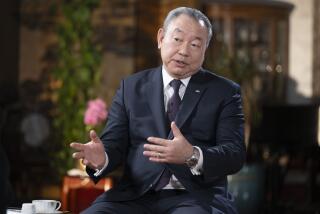China Protests Granting of U.S. Visa to Taiwan Leader
- Share via
BEIJING — China demanded today that the United States rescind permission for Taiwanese President Lee Teng-hui to visit and threatened “serious harm to Sino-U.S. relations” if the American government does not cancel the proposed private trip.
“If the United States maintains this erroneous situation,” the Foreign Affairs Ministry said in a statement issued this morning, “it will inevitably bring serious harm to U.S.-China relations, and all the consequences will be the responsibility of the U.S. government.”
The sharp Chinese reaction--the latest setback in U.S.-China relations already strained over trade and human rights issues--came only hours after a State Department announcement in Washington that Lee would be permitted to attend a June 8-11 alumni reunion at Cornell University in Ithaca, N.Y., on a transit visa.
“President Clinton has decided to permit Lee Teng-hui to make a private visit to the United States in June for the express purpose of participating in an alumni reunion event at Cornell University as a distinguished alumnus,” State Department spokesman Nicholas Burns said in a news briefing.
The State Department announcement hinted at a loosening of U.S. policy regarding visits by Taiwanese officials, which Burns said would be reviewed on a case-by-case basis. Significantly, Burns did not rule out the possibility of meetings between Lee and members of Congress during the “private and unofficial” visit.
The Cornell visit, which won overwhelming support in the U.S. Congress earlier this month, has been the focus of intense lobbying efforts by Taiwan as it attempts to win greater recognition from the United States. Diplomatic relations between the two countries were severed in 1979 when the United States formally recognized the People’s Republic of China.
But Lee’s visit has been fiercely opposed by the Beijing leadership, which claims it violates the “one China” policy adopted by the United States in its 1979 agreement with the People’s Republic of China.
The Clinton Administration and members of Congress attempted to downplay the significance of Lee’s visit to Cornell, where in 1968 Lee obtained a doctorate in agricultural economics.
“This perhaps will be a bump in the road in our relations with the People’s Republic of China, but it is not going to be a train wreck,” said Sen. Frank H. Murkowski (R-Alaska), one of the sponsors of a congressional resolution urging Clinton to approve Lee’s visit.
However, most mainland Chinese newspapers this morning carried front-page articles condemning the visit and warning of serious consequences to U.S.-China relations.
“What the American government did,” the People’s Daily editorialized on its front page, “damages its own international prestige, damages Sino-U.S. relations and damages America’s principal interests.”
The People’s Daily, official organ of the Chinese Communist Party, blamed the U.S. decision to grant a six-day transit visa to Lee on “several stubborn anti-China elements in the U.S. Congress. They don’t admit the existence of the People’s Republic.”
In Taiwan itself, however, most newspapers and broadcast media kept a lid on jubilation over the diplomatic breakthrough.
Urged the Taipei-based Independent Post:
“To avoid irritating China and embarrassing America, we had better play down Lee’s visit. The current situation between the U.S. and Taiwan is pretty delicate. There are lots of things that don’t need to be broadcast around. We should not let America think of us as a troublemaker.”
The pro-Taiwan independence Liberty Times newspaper, however, was more celebratory.
“Lee’s trip to the U.S. can create a chain reaction in Taiwan’s diplomacy,” it said. “The point is that it is more than a private visit by a head of state. America’s acceptance of the fact of President Lee’s visit implies a tacit recognition of the Republic of China [Taiwan] sovereignty.”
More to Read
Sign up for Essential California
The most important California stories and recommendations in your inbox every morning.
You may occasionally receive promotional content from the Los Angeles Times.








